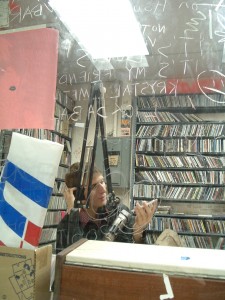It was some pretty exciting news from the FCC on Tuesday, when they announced the list of 59 organizations who won the non-commercial educational radio license lottery. Although I was thrilled for some of the winners, as a college radio observer, I was saddened and surprised to see that very few colleges or educational institutions applied for these coveted licenses.
As Paul reported on Wednesday, the largest percentage of new licenses went to religious groups (at least 17), whereas only a handful were awarded to educational institutions (colleges, primary or secondary schools). In some cases college radio applicants lost the race against religious groups due to the complex point system (looking at local ownership, population served, etc.) that the FCC uses in its decision-making.
Scanning through the FCC’s grid of groups who applied and won, it’s often quite difficult to figure out which are actually affiliated with educational institutions. For example, Central Florida Educational Foundation (which won a new license) operates a whole network of 10 non-commercial Christian radio stations in Florida.
A closer look at the 7 winners in the college/primary/secondary school category reveals that only a few are likely to have any sort of student involvement in the resulting radio stations. Two of the groups already run networks of religious stations, one runs a LPFM community station, and another runs a public radio station. Of the remaining three institutions, one has both public and student radio stations, another has a broadcasting program, yet no station, and a third currently owns the license for a student station.
So, the question from me is, why didn’t more colleges/universities/high schools go for it back in 2007 and apply for these new radio licenses? It’s clear that religious groups are organized and have the funding to pursue radio expansion, but it saddens me that college radio for the most part sat on the sidelines while these licenses were doled out to groups with a very different take on educational radio. The Future of Music Coalition has a great fact sheet that gives a bit of perspective on the process for obtaining these licenses and it’s a good reminder that financial considerations are probably a key reason why college stations might have been scared off from applying.
Here are the college radio groups who won:
Arizona Western College (AZ): Won. They are already in the public radio business, owning the license for public radio station KAWC, so this may be for an additional outpost of that station.
Iowa Lakes Community College (IA): Won. They have a broadcasting program, but don’t seem to currently have a licensed radio station.
Iowa State University of Science and Technology (IA): Won. They already own the license for student radio station KURE 88.5 FM in Ames, Iowa. The new license is for Sioux City, so they may just be expanding their coverage.
Edinboro Early School (MD): Won. Edinboro Early School is a nursery school/kindergarten/child care facility and they own the license/provide most of the funding for WEES Radio 107.9 FM, a LPFM station. The community radio station is not located at the school, but airs family-oriented programming. As part of the application process, they have agreed to “divest” the LPFM station in order to obtain a full-power license.
Curators, University of Missouri (MO): Won a license for Warrenton, Missouri. University of Missouri holds the license for several public radio stations, including KMST-FM and KBIA-FM. There is also a student-run station, KCOU-FM.
*Westminster Academy (FL): Won. This is a K-12 Christian school. Interestingly, Westminster Academy already owns Christian radio station WAFG, which seems likely to be a separate entity from the school. They also applied for 3 different licenses in Florida in this round.
*Liberty University (NC): Won. They operate a large Christian radio network. Interestingly, they beat out the Board of Trustees, University of North Carolina, Chapel Hill.
And here are the colleges who lost:
Appalachian Performing Arts Inst. (AR): Lost to Speakonit Radio
San Diego State University (CA): Lost to Borrego Springs Christian Center
State of Oregon, State Board of Higher Education (OR): Lost to IHR Educational Broadcasting (CA)
Brigham Young University-Idaho: Lost to Idaho Community Action Network
McNeese State University (LA): Lost to Neighborhood Improvement COAL ACORN
University of Massachusetts (MA): Lost to Berkshire Community Radio Alliance
Appalachian Performing Arts Institute (ME) AND
University of Maine (ME): Lost to Fraternal Building Association
Pensacola Christian College (MN): Lost to Religious Information Network
Board of Trustees, University of North Carolina, Chapel Hill: Lost to Liberty University (NC), which operates a large Christian radio network (as reported above)



